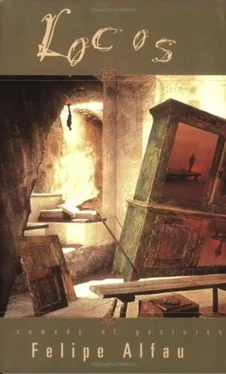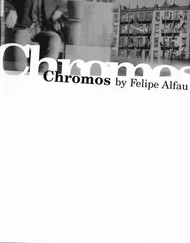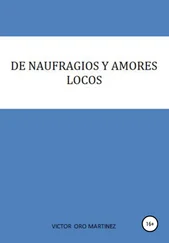Los Madrileños formed a very small group. We were only four: Julio Cavañas (we always called him Cavañitas), Pepe Bejarano, Felipe Alfau and myself.
Another pleasant thing was Padre Inocencio. Although he was a Basque, born in Bilbao, he had lived a long time in Madrid where he had many friends and still went there often for short trips. We naturally felt that he sympathized with our cause and he lent us moral support.
As I have already said, everything at that period is vague in my mind, but I know that he held some important post, a director, chaplain or something at a convent that was located on the same road, next door to our school. When he was in Vizcaitia, he always spent part of the day in our school where he taught literature and part of the day at the convent, I presume attending to whatever duties he might have had there. To be very frank, I do not know whether there are chaplains or directors at convents, for, as I have overlooked saying, my ignorance about all matters which constituted my daily routine at that time is appalling. It is easy to understand considering the condition of my mind during those days. But at any rate I know that Padre Inocencio was connected with the convent in some important capacity.
Padre Inocencio was somewhat of an exception and a revolutionary character in the village and among the other priests. He was a good friend of my family and a constant member of our home gatherings while we stayed at Vizcaitia.
All these circumstances made me feel that I had a friend and protector while he was at the school. I grew rather fond of Padre Inocencio and Mother liked him very well, a thing which made him grow still more exceptional in my eyes, since it was not a secret at home, not even to me then, that she had a decided contempt for anything connected with the Church. The only reason why my mother ever let me attend a school of priests is because it was the only so-called good school in Vizcaitia, because practically all reliable schools in Spain are in the hands of priests or nuns and because one seldom finds a school in Spain where something pertaining to the Church is not hidden in some corner. Perhaps Padre Inocencio had a hand in it also.
But as I was saying, my mother liked Padre Inocencio and in the attempt to describe his character partly, I am quoting her.
Padre Inocencio was a worldly person. He liked society and the arts. He was an accomplished landscape painter and a good poet. His all-around culture and fine graceful manners set him high above the general rabble of Spanish priests whose rampant and sordid ways are most obnoxious, and who literally steal their way into the homes and pockets of really good people by craftiness and the well-combined use of superstition and fear of hell.
Padre Inocencio did not mix much with the other priests. In the afternoons while the roads of Vizcaitia swarmed with gentlemen of the frock from all the nearby monasteries, in their dark robes, like an army of cockroaches, Padre Inocencio could be seen walking alone through some hidden pathway reading his book of prayers, perhaps dreaming, cleanly shaven, subdued, unobtrusive, a decided contrast to the other priests.
And yet Padre Inocencio was not a born ascetic. I have heard Mother say so. And it was all he could do to keep mundane thoughts away and to conquer the stubborn flesh. Padre Inocencio was a born romantic and he loved the world too much. He had taken orders, and although it was more than he could bear, he would rather curb his feelings than sacrifice a promise he had made openly and accepted of his own accord, and he was constantly disentangling himself from the snares set in his pathway by the seven mortal sins, as my mother used to put it.
Padre Inocencio suffered a constant internal warfare. He liked women as much as women liked him. His engaging personality had won him the favor of all the ladies in Vizcaitia and they would either confess their sins to no one else, or confess to anyone but him.
But much as Padre Inocencio was tempted, he never yielded and I have heard Mother say that he was the only priest she had known to lead a chaste and ascetic life in Spain.
And such was his character to the best of my knowledge:
Padre Inocencio was an exceptional priest.
He never stole.
He never prevaricated.
He never committed rape.
He always sacrificed himself.
And one day he committed suicide.
Why Padre Inocencio took his own life is more or less of a mystery to all those who knew him. To me it is fatality. Everything that took place at that time was imprinted on my mind through such a cloud of confusion that it sweeps my memory like a hurricane of disconnected phenomena, apparently without cause or effect.
Some people say, among them my mother, that the vows were too much of a burden for him and that he realized he was incapable of going through with the life of a priest. Some other people say that there was an unhappy love affair, that his vows rose between him and his love and that he decided to destroy himself before destroying his vows. It seems to me that both explanations come down to the same thing. I have no personal opinion upon the subject. I will simply attempt to extricate from the fog surrounding them the few outstanding happenings in my memory which preceded this unhappy ending.
One day we learned that Padre Inocencio was going to Madrid and, what is worse, that he was taking Pepe Bejarano back to his family, who were going to send him to school in England.
Padre Inocencio interceded in our favor and we Los Madrileños were given permission to accompany them to the station.
Not one of us spoke during the ride. We, the ones who were to be left behind, felt a mixture of sadness and admiration for our lucky companion.
For some reason or other we felt that to speak to Pepe at this moment was to take too many liberties with an important person. An embarrassing barrier of formality had suddenly sprung up between us who had always been so intimate. We were all silent and even Padre Inocencio only spoke a few necessary words. At that time I flattered myself that he must have felt sad to part with us. Now I know how little important we must have appeared to him, with our fallen socks, our dirty school robes and our dusty boinas .
As they boarded the train, there was some effusiveness. Pepe set the example; he embraced Cavañitas and then each one of us. Padre Inocencio patted us on the cheek and placed a conical package of sweets in Alfau’s hands:
“For all of you, and don’t fight for them. Now run along to school and be good boys.”
As the train departed, Pepe shouted from the window:
‘‘Sostened el nombre de los Madrileños. “
Blushing and feeling quite silly, we all answered in chorus that we would and there we remained for a while watching the train recede.
Then there comes another fog in my memory out of which only one incident stands out clearly like a colorful picture upon a black background.
I cannot recall the circumstances or even how it came about. I only remember that I was standing with my mother in the road that led to the school and that she was talking to a man who held a horse by the bridle.
Then the man helped my mother on the horse and she drove away as far as the school and then turned back at full gait.
My mother was very blond and was dressed in some sort of green dress. The sun was bright and the horse big and white.
I remember that my mother’s hair came undone and flamed in the wind like molten gold, and that when I saw her approaching thus, upon that great white horse at full gallop, I instinctively shrank back and hung on to the man’s coat in a mixture of fear and admiration. I always remember with amazing clearness that dazzling scene, of my mother advancing ominously upon that white horse. I don’t know why, but from that day I stopped taking her for granted.
Читать дальше












